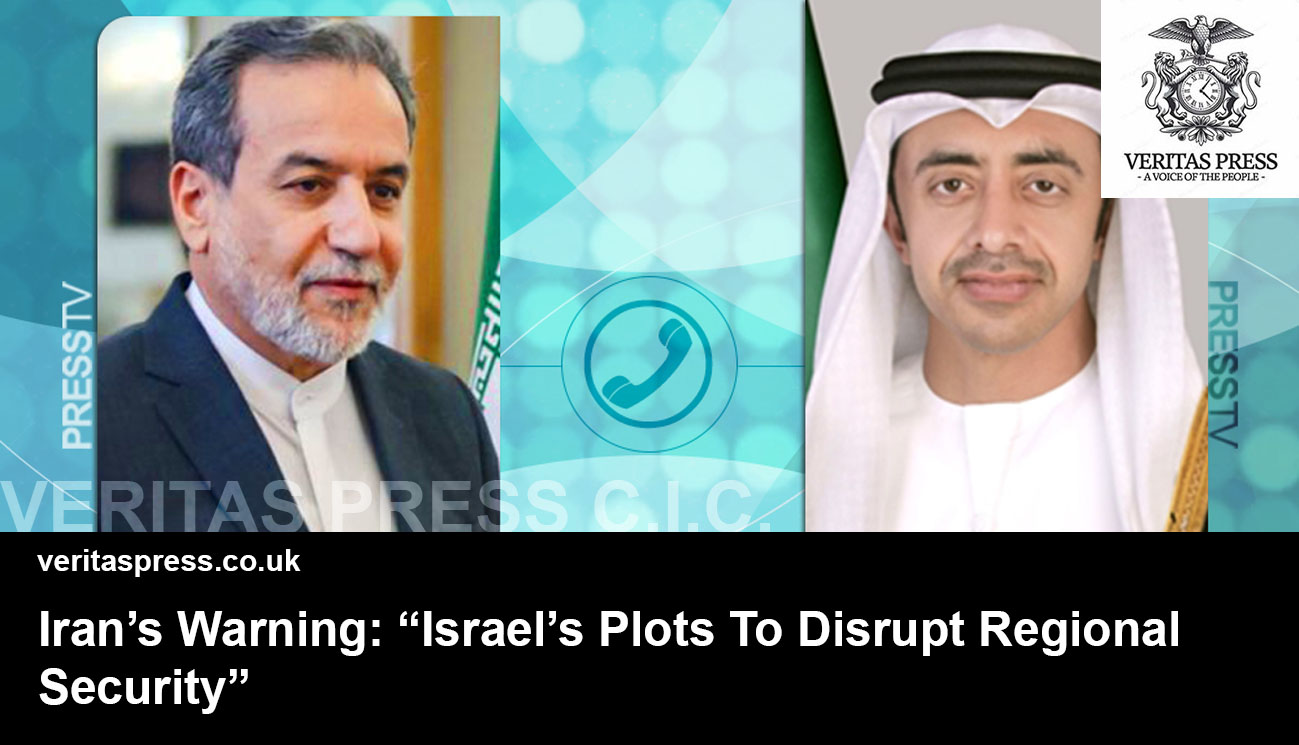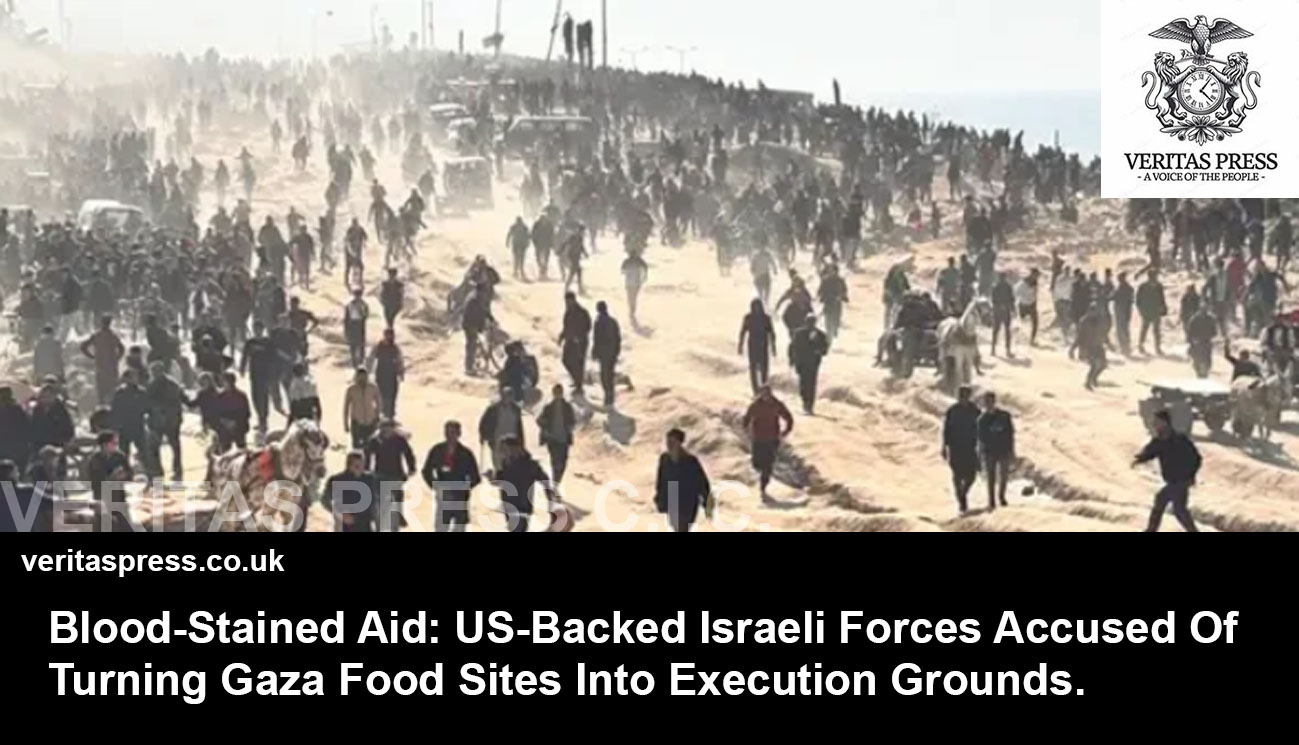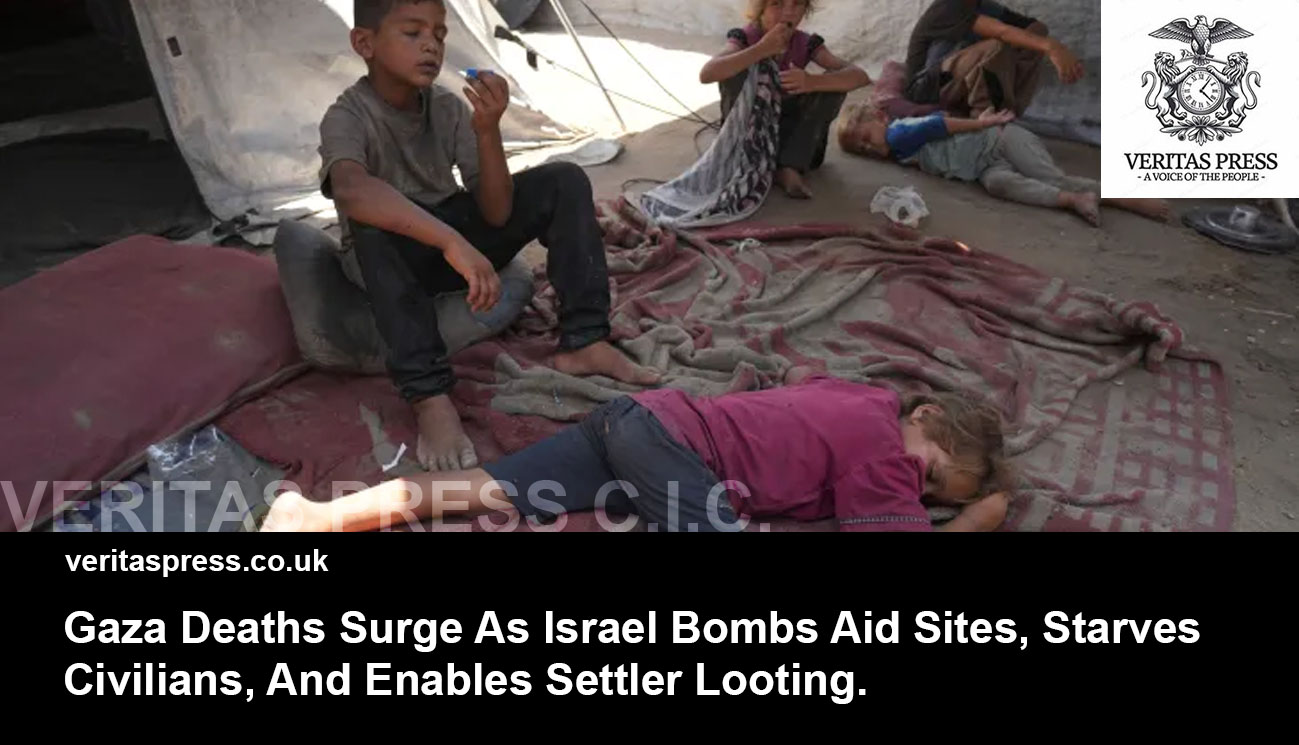Press Release: Veritas Press C.I.C.
Author: Kamran Faqir
Article Date Published: 01 Aug 2025 at 21:04 GMT
Category: West Asia | Iran | US-Israel At War
Source(s): Veritas Press C.I.C. | Multi News Agencies
Iran’s Foreign Minister Abbas Araghchi issued a stern warning on August 1, 2025, stating that the Israeli regime is actively plotting to destabilise regional security and urged all countries in the region to remain on high alert.
Araghchi made these remarks during a phone call with the UAE’s Deputy Prime Minister and Foreign Minister Sheikh Abdullah bin Zayed Al Nahyan, underlining Israel’s alleged addiction to “warmongering and lawlessness.” The two diplomats reviewed developments in Palestine and discussed intensifying cooperation in political, economic, and commercial domains. They emphasised leveraging their countries’ shared capacities to expand relations around issues of mutual interest.
Regional Security: Iran–UAE Collective Cooperation.
In a related development, senior security officials from Iran and the UAE reiterated the need for collective regional cooperation to preserve stability. Following the recent 12-day Israel–US offensive against Iran, Ali Akbar Ahmadian (Secretary, Iran’s Supreme National Security Council) and the UAE’s National Security Advisor Tahnoun bin Zayed Al Nahyan jointly called for coordinated regional security mechanisms.
Broader Context: Israel–Iran Conflict And Regional Implications.
A Turning Point: Israel’s June 2025 Offensive.
In mid-June 2025, Israel executed Operation Rising Lion, a combined Mossad covert drone sabotage campaign inside Iran and a massive airstrike campaign, targeting missile systems, nuclear infrastructure (including Natanz and Isfahan), and top IRGC leadership such as Hossein Salami, Mohammad Bagheri, and others. Approximately 200 Israeli fighter jets struck over 100 targets across Iran, significantly undermining its strategic capabilities. This escalation disrupted U.S.–Iran nuclear talks and derailed diplomatic efforts.
Iran’s Response And The Ceasefire:
Iran retaliated with missiles and drone strikes, launching roughly 100 drones and numerous missiles toward Israeli cities like Tel Aviv, Haifa, and beyond. After 12 days of open conflict, a U.S.-brokered ceasefire formally took effect on June 24, 2025, largely holding through late June. While official restraint prevailed, cyber and sabotage operations persisted, including suspected Israeli acts targeting Iranian oil facilities, such as a major fire at Abadan refinery.
Aftermath And Strategic Adjustments:
Post‑war, Iranian authorities have accelerated security-related legislation, curbing dissent, intensifying anti-espionage laws, and suspending cooperation with the IAEA, which highlights internal fissures between moderates and hardliners. Iran is also reportedly upgrading its navigation systems by adopting China’s BeiDou to replace vulnerable Western GPS infrastructure.
Meanwhile, Iran’s “Axis of Resistance”, once comprising Hezbollah, Hamas, Iraqi Shiite militias, and Yemen’s Houthis, has displayed caution or inactivity following the war, avoiding escalation amid fears of Israeli retaliation.
Analysts emphasise that the recent war highlighted the evolution of regional conflict: blending high-precision strikes, cyber and psychological operations, and tightly integrated U.S.–Israeli intelligence support as core dynamics.
Iran’s Intensifying Rhetoric: Threats And Accountability.
From Diplomacy To Public Condemnation.
Beyond the UAE, Iran’s Foreign Minister Araghchi has also warned that Israel is scheming to spread conflict beyond the region, to Europe and the world, labelling Israeli actions as criminal aggression that demands accountability from the UN Security Council and governments globally.
Military Hardlines And Retaliation Warnings.
Iran’s IRGC spokesman Ali Mohammad Naeini announced that future retaliation would shift the battlefield to new geographies and deliver more crushing force than before. Public figures like IRGC leadership and former commanders have issued increasingly stark rhetoric, including threats of Israel being “wiped off the face of the earth”.
Interpretation & Analysis:
1. Heightened Regional Alarm:
Araghchi’s warning reflects Iran’s view that Israel’s actions, in both covert infiltration and overt airstrikes, pose systemic risks to regional stability.
2. Seeking Regional Alliances:
By engaging the UAE more closely in security cooperation, Iran aims to reinforce the idea that Gulf states should collaborate in resisting perceived Israeli threats.
3. Strategic Messaging:
Iran’s external rhetoric, combined with its post-war securitisation and recalibration of military posture (e.g., GPS replacement), signals both internal consolidation and external deterrence.
4. Uncertain Future Trajectory:
While Israel has gained military and intelligence dominance according to analysts, the long-term prospects for peace remain fragile. Civilian suffering in Gaza, continued occupation, and splintered leadership across Palestine suggest peace remains elusive unless accompanied by diplomatic pressure, a point repeatedly raised in media analysis.
Summary:
- Foreign Minister Araghchi’s call (Aug 1, 2025) highlights Israeli “plots” aimed at undermining regional security and urges vigilance from GCC states.
- Iran–UAE diplomatic ties are being reinforced with an eye toward a coordinated regional response.
- The June 2025 Israel–Iran war, including covert Mossad operations and retaliatory strikes, represents a watershed moment that upended deterrence norms.
- Iran continues to signal future retaliation through military and diplomatic channels.
- Regional actors and global observers remain concerned that without de-escalation or diplomatic change, the Middle East may tilt toward persistent instability.




























Leave a Reply